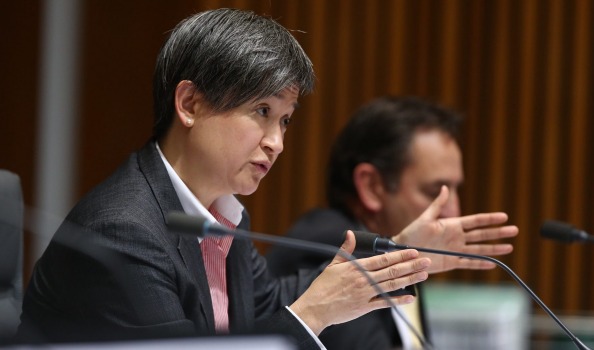Coalition expects to cut deal with Labor over China trade agreement
Australian Financial Review
Coalition expects to cut deal with Labor over China trade agreement
12 October 2015
By Phillip Coorey

There have been several discussions between Trade Minister Andrew Robb and his opposition counterpart, Penny Wong. Photo: Andrew Meares
The federal government is leaning towards doing a deal with Labor on the China-Australia Free Trade Agreement but argues that such a decision would be a pragmatic one designed to get the deal in place, and not a concession to the opposition.
Labor will officially release its proposed changes to safeguard Australia jobs on Tuesday, after they have been approved by the Caucus. They were approved by the shadow cabinet on Monday night.
A government source said on Monday that there had now been several discussions between Trade Minister Andrew Robb and his shadow counterpart, Penny Wong, and the government was, in principle, amenable to the Labor compromise because it was effectively having to give away nothing.
"It’s not a cave-in, it’s not to appease Bill Shorten or make him look good and it’s not conceding anything was wrong with the agreement," the source said.
"It’s a pragmatic decision to get this through so the millions of dollars in tariff reductions can flow through to business."
He said enshrining local labour market testing in legislation "just mirrors what we say are already mandatory requirements".
As revealed by The Australian Financial Review, the ALP will now insist on legislated changes to the Migration Act to enforce local labour market testing before workers were imported for large projects under Investment Facilitation Agreements (IFAs), but with no specific mention of China or the China-Australia Free Trade Agreement.
The safeguards would, in effect, apply generally to all FTAs, would be non-discriminatory so as not to offend China, and would require no change whatsoever to the agreement itself.
At the same time, it would still assuage labour movement concerns over the China agreement, which has more generous provisions for imported workers on large projects than any comparable deal.
These Investment Facilitation Agreements allow for the importation of workers for projects valued at $150 million or more, of which a minimum 15 per cent has to be Chinese investment.
Labor has also softened its original stance and will drop a demand that the agreement be stripped of the Investor-State Dispute Settlement (ISDS) mechanism which would enable a Chinese company legal recourse against a policy decision by an Australian or state government should it feel it contravened the FTA.
Labor may drop market testing demands
Sources suggested on Monday that Labor may also drop its demand that labour market testing be mandatory before 457 visas are granted from such professions as nurses, engineers, electricians, plumbers, welders and carpenters.
To change this would to change the text of the agreement itself, something which Labor has said it would not do because China has threatened to walk away should it be touched. Chapter 10 of the agreement removes the government’s ability to apply labour market testing for these professions.
The amendments to the Migration Act to cover lower-skilled 457 visa workers would not be changing the deal itself, just reinforcing a commitment the government has given.
But bodies such as the Australian Industry Group and the Australian Chamber of Commerce and Industry are concerned about the imposition of such legislation on the 457 visa program which is used to import skilled labour on a temporary basis.
Senator Wong said on Sunday her proposals would be non-discriminatory and should be accepted.
"And now will be the time for Malcolm Turnbull to demonstrate he’s not Tony Abbott and that he’s prepared to have a conversation based on facts with the Opposition in the national interest."
However, she and Mr Shorten still face a challenge internally with elements of the caucus indicating they would challenge the compromise. One backbencher, speaking on the condition of anonymity, said Labor should block the deal rather than water down its demands.
The Lower House is scheduled to begin debating the legislation this week and debate is due to start in the Senate on November 9. There will be three sitting weeks before Christmas during in which it must pass.
If the deal is passed and in force by mid-December, agricultural exporters, for example, will receive $300 million in tariff reductions extra this financial year.
The deal has been scrutinised by Parliament’s Joint Standing Committee on Treaties. The committee’s final report is split along the party lines of its members with the Coalition majority believing the deal should be legislated as is.
The report was expected to be handed down Monday but the release has been delayed until next week because committee chairman Wyatt Roy was promoted to Malcolm Turnbull’s new ministry.
He is expected to be replaced by NSW MP Angus Taylor but the process has caused the delay.
The government needs Labor’s support for the deal because it is opposed by the Greens and a about half the Senate crossbench, including Nick Xenophon, Jacqui Lambie and John Madigan.





